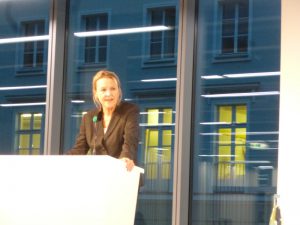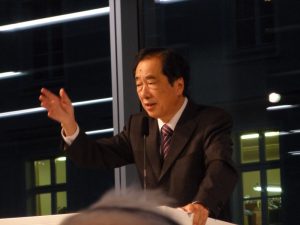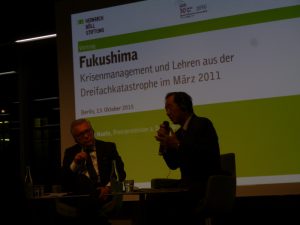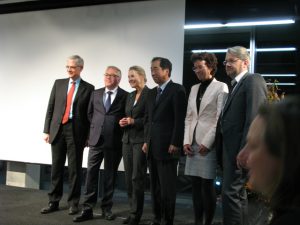Date: 2015-10-13 (Tue)
Venue: Heinrich Böll Foundation, Berlin
We had a lecture entitled “Crisis Management – Lessons Learned from the Threefold Catastrophe in March 2011” by Naoto Kan, former prime minister of Japan.
The hosts and German politicians started by introducing this lecture then explaining the current German situation. On German energy policy they mentioned the following:
- Referring to Merkel’s Memorandum and her plan to replace all the German nuclear power plants with renewable energy, they said: “Concerning the fact that even one of the world’s leading technology countries like Japan has faced such a catastrophic accident, it makes sense for Germany to abandon its nuclear power plants.”
- Compared to Germany, Japan has more natural energy. Japan can use wind energy, solar energy, and energy from biomass, but also geothermal and tidal energy. Moreover Japan has world class technology. The only missing piece would be the political decision.

Then, the organizer introduced Naoto Kan. The following is a summary of Kan’s lecture.
Just after the accident [March 11th, 2011], we found out there was no crisis management in Fukushima, because everything was built on the assumption that the atomic reactor was safe. Around March 22nd (2011), I asked a specialist to evaluate the worst-case scenario. He said that all the people who lived inside a circle of 250km radius from the reactors needed to be evacuated for a few decades. Tokyo lies within the circle. 50 million people would lose their home. I recognized that in fact the problem was, if Japan could continue existing. How could we manage 50 million refugees at once if the worst-case scenario happened?
At the early stage of the accident, both the government and TEPCO did not know what happened and could neither manage to circulate information about the accident. On the other hand, the plant manager called Yoshida improvised a new way to cool down the reactors because all the common methods had broken down. Japan was saved by mainly the people on the spot, including fire fighters, police, self defense forces and TEPCO workers. According to TEPCO, the melt down of nuclear fuel emits 70Sv/h radiation. The radiation can kill a nearby person within five minutes. The containment vessel was damaged due to the high pressure, but it only had holes. Therefore, fortunately, this fuel was not dispersed into the air, but melt down into the earth. We found out that there was no simulation for such a high pressure accident, since the assumption had always been, that an accident was impossible. If the containment vessel had blown up instead of just punching holes, we would have had no idea what happened. The fuel pool of reactor IV contained nuclear fuel, but the pool had no containment vessel. We worried that the water could dry, but we could not go near due to the high radiation. However, coincidentally, there was extra water due to the delay of the maintenance work that was being done there and so the meltdown was unexpectedly avoided. “I know this is not the words from a politician, but I can only think that God protected us.” Today we still need to cool down the fuel by putting 300 tons of water every day onto it. But the containment vessel has holes, so the water is leaking. We pumped up the water and put it in tanks. But we cannot pump up all the water. It is still not under control today.

We are working on Fukushima’s decommissioning. The current plan says it will take 40 years, but I personally think we need more time to finish it.
I thought about the question why this accident happened. There was a chain of the causes. They also lie equally in hardware and software, by software human factors are meant. The average height of the shore line of Fukushima is around 35m. TEPCO lowered 20m of this height and reported how they save the pumping water costs for cooling down the reactors. They put the emergency electricity generators at a low place. This severely failed design caused the accident. These are hardware problems. On the other hand, there were also software problems. In Japan many accidents of this kind are caused by earthquakes, which are often followed by tsunamis. However, this possible situation was not considered. The bureaucrats who are responsible for the security of accident are not specialists for atomic reactors. For example, when I met the responsible person of the reactor accident, I asked the responsible person, “are you a specialist for atomic reactor?” The responsible person answered, “I graduated from the economy department of Tokyo University. I don’t know technical details about the reactor.” The organization for the reactor accident and the organization of the propelling nuclear reactors were the same organization. This chain of problems led to the accident.
Before 3.11 I have always recommended to sell Japanese reactors to other countries. But after 3.11 I completely changed this opinion.
After the accident, we first separated the department of the nuclear safety and the department propelling the nuclear reactors. We also changed the regulation so that it becomes more safety oriented. This basically shut down all the reactors in Japan.
We introduced a law to encourage green energy. We studied the German FIT system.
In the future, I want to abandon the fossil fuel and want to shift to all the sustainable energy in Japan. A research report says that the current human energy consumption is only 1/10000 of energy from the sun to the earth. If each country can support the energy by its own, one of the large international conflict source will be solved. It seems the national security will be better if we could shift to the natural energy. I admire Germany as a forerunner. I heard there are many different opinions in Germany, though I was quite impressed that Merkel changed the German energy policy to be based on the sustainable energy just after a few months after the Fukushima accident. I am disappointed with the current Japanese energy policy since it is not going only towards sustainable energy. However, it was revealed that the nuclear energy is not cheap. Thus, I expect the nuclear energy will be abandoned in this century due to economical reasons. But, there is no guarantee that there will be no other accident before it is abandoned. Let’s not wait until it is too late.
At the end of the lecture, Kan concluded “Fortunately, we could avoid the destruction of the country. I felt there was a protection of God. But, I don’t know whether there will be another protection when the next accident happens. My aim is to abandon nuclear reactors all over the world before the next accident.”
After the lecture, we had a lively question and answer session.
Q: Why is Japan still not able to abandon the nuclear power, even after the accident?
A: According to the opinion polls, a majority of Japanese wants to abandon nuclear power. However, the Japanese business community and the people who depend on nuclear power businesses are still strong. At the end, we need to promote the denuclearization by the election, but the focus of the last election was economy policy, and the LDP, which promotes nuclear power, won the election. Therefore we have not achieved the denuclearization.

Q: Why do power companies, such as TEPCO, continue to promote the nuclear power even after they faced an accident like Fukushima?
A: The government wanted to promote the nuclear power, the power companies however didn’t. The government gave the power companies the authority to add up to 3% on top of the electricity costs depending on how much they invest. It is a rate-of-return regulation for power companies. In other words, if a power company has higher costs to produce power, their profits become higher. The power company can get more profit not requiring the endeavor of the company. Therefore, the power companies would like to promote the nuclear power since it can increase the profit without any effort.
The power company can abuse the rate-of-return regulation legally. For example, a power company can have an order with deliberately high cost to a general contractor. They can raise the electricity price due to the regulation, so the user must pay this cost. There could be a secret agreement that the general constructor pays back a part of the higher cost. A book recently revealed this mechanism and the pay-back is estimated at around 200 billion yen per year. The power companies use this money to promote nuclear power. Even though the accident cost 10 trillion yen, until now it was mostly covered by the tax. Therefore this situation is quite attractive for the power companies in Japan which are also favored to the many politicians.
Q: How did Japan change after 3.11?
A: I think there were many changes. One thing I would like to mention is the change in court’s attitude. The court did not use not make decisions about the safety, they used to let the experts decide since nuclear power plants are highly technical. Even though this is only true for some members, but they changed their attitude. In the future, I expect that the nuclear energy business cannot sustain due to its high costs and also the emerging of renewable energies. I believe nuclear power plants will be abandoned in this century. However, this is an economical movement and not a political movement. That is unfortunate.
Q: Will the change not happen politically?
A: I think the change might happen from grassroots movements. But they are not seen in the outcome of the national election in Japan. I heard that the German system has more weight for the proportional representation than the Japanese system. Japan uses single-member district method for election. This system has a wasted vote problem. For example, if 10% of people are against the nuclear reactor, these people’s votes are wasted in single-member district method and these 10% people are considered as 0. We need to have enough anti-nuclear people in the Japanese diet, however, Japan has not yet reached so far.
Q: How has information been verified when the accident happened?
A: At the time, critical information had been hidden, many of them are still not publically available. The communication line between TEPCO Tokyo and Fukushima site had been connected for 24 hours. However, only the information chosen by TEPCO was made public. For example, at March 15th, I visited TEPCO and asked the TEPCO officials not to retreat from Fukushima site. The video has been published without voice. TEPCO said the voice was erased by mistake, but I personally don’t believe it. Now a prosecution of the officials is carried out, so I expect more information will come to light.
Q: What kind of person is Yoshida, the general manager, who prevented the accident to become a lot worse?
A: Unfortunately Yoshida, the general manager died of cancer two years after the accident. Whether the cancer is the cause of exposure is unclear. I was able to meet him once just after the accident. I recognized immediately that he was a reliable person.
Q: How have the decisions to evacuate the site or to allow people to return been made?
A: At the time of the accident, the government’s monitoring ability was low and there was a danger that the containment vessel was going to be destroyed. So we decided to evacuate the area within a certain radius having the reactors as its center. Then, we figured out that the distributed radioactive substance depends on the wind. But this took time. Evacuation criteria differed by experts. The current criterion is 1 mSv/y. The number of children being patients is increasing, but some experts say that this is due to our checking method which is strict and makes numbers only looks like they were increasing. Municipalities tend to lower the criterion to make it easier for the people to return, since they want them to return to the area. Basically, we decide according to the experts’ opinions, but I have question this is appropriate.
Q: Why can your party (Democratic Party of Japan) not win the elections?
A: The effect of single-member district election method is strong. Within this system, we always need to get the first position in the district. Therefore, even if the 10% of the people favor our party, it is possible that we do not get a seat in the diet.
